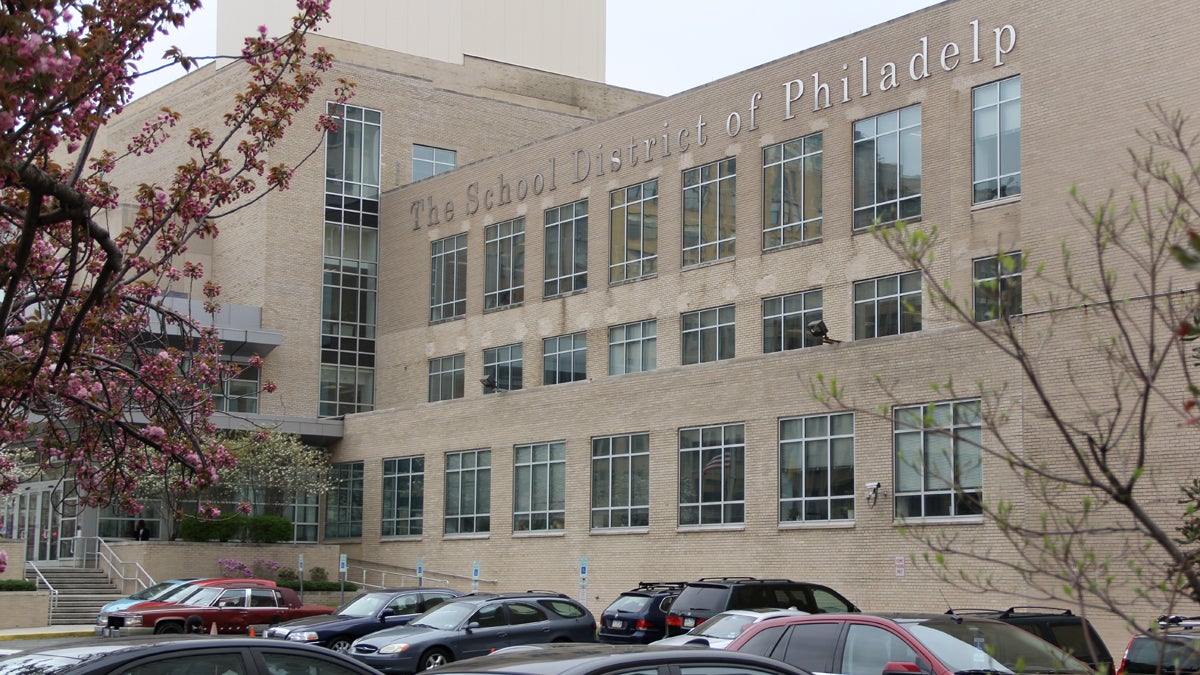Philly schools could be broke by mid-October without state money
Listen
Philadelphia School District headquarters at Broad and Spring Garden streets. (Emma Lee/WHYY)
When I was a child, the start of the school year was a time of giddy anticipation. It was a time of new clothes, new books, new friends, and the chance to outshine the accomplishments of the year before.
That was many years ago, before perpetual deficits and the slow erosion of public trust made books, and then students, and then dozens of underutilized schools disappear.
Sadly, the excitement that should accompany the start of a new school year in Philadelphia has been replaced with a nagging sense of anxiety. That’s especially true this year, because the state budget impasse has created a situation in which Philadelphia’s schools could be broke as early as mid-October, according to Philadelphia School Superintendent Dr. William Hite.
“Without monies coming from the state … we will have cash to operate and open schools, but at some point that runs out,” Hite told me in a radio interview.
“And that runs out because the [money] that we would normally get from the state between August and September is not coming. That means that the district has to run on its own cash flow—not just the district, charter schools—so this could impact all 203,000 children who are being educated in public schools here in Philadelphia.”
It wasn’t supposed to be this way. Not again.
City Council, in spite of some misgivings about the district’s lack of fiscal accountability, came through with most of the district’s $105 million budget request for the upcoming year.
In three bills, Council passed a tax package that is projected to provide the School District with a total of $70 million from a 4.5 percent property-tax hike, a tax on off-street parking, and an increase in the Use and Occupancy tax on businesses.
The city also held a pilot tax lien sale in hopes of raising another $30 million for the district. Early estimates said only $2 million was raised from that tax lien sale.
I asked Mayoral Spokesman Mark McDonald for the exact amount the City received in the tax lien sale. He did not respond in time for this column. I also asked School District spokesman Fernando Gallard for the amount the District anticipated receiving from the tax lien sale.
“We have not yet received results of the pilot,” Gallard said in an email.
That brings us to the state.
The School District requested $206 million from the state earlier this year. Gov. Wolf’s budget proposes a $159 million hike in basic and special education funding for Philadelphia schools. The Republican-controlled legislature passed a budget that included far less for Philadelphia schools. That budget, which was vetoed by Wolf, included about $21.8 million for the Philadelphia School District, more than enough to cover the $18 million the district says it needs to cover the deficit for this year, but not enough to restore some of the items that were cut in recent years.
But it’s about more than just numbers, state Sen. Vincent Hughes told me in a radio interview. It’s about a recent history of disinvestment in schools, and devastating consequences in the classroom.
“Statewide test scores for our kids have dropped dramatically,” Hughes said. “It’s largely a result of two things. First of all, the 4 years of underfunding in our schools has really made it hard to create the right kind of academic environment for our kids to get an education.” Hughes added that less resources combined with more rigorous standardized tests have made it harder for students to do well.
“What it really says to me, it underscores once again the need for the restoration of the millions of dollars that were cut from our education system over the last four years, which is what we’re fighting for, what the governor’s holding out for, what we are fighting for in these budget negotiations,” Hughes said.
And that’s fine. We expect the governor and our state legislators to fight. But what if the fight stretches on through October? What if the fight doesn’t yield the expected results? What if the schools run out of money?
I reached out to Wolf spokesman Jeff Sheridan to ask for the governor’s contingency plans in case budget negotiations stretch through October. He did not answer in time for this column.
Contingency plan or not, here’s what I’d like to see as the parent of a Philadelphia public school student. I’d like to see our state meet its obligation to provide a quality public school education to every single student.
That means addressing the fact that Pennsylvania is home to America’s largest spending disparity between rich and poor school districts. It means owning up to the fact that right now in Pennsylvania, high poverty school districts spend 33 percent less per student than those in the group with the least poverty.
That’s wrong, and while that ugly disparity was not created under this governor, fixing it should be his first priority.
Doing so will require compromise. It will require working with Republican legislators. It will require a single-minded focus on the one thing that should matter most to all of us—our children.
As a parent who remembers a time when the first day of school was about anticipation rather than anxiety, I hope that both the governor and the legislature remember what’s most important.
I hope that come mid-October, the nervous feeling I have about our schools’ ability to remain open will be nothing more than a bad memory. I hope that by then, we’ll be well on our way to fixing all that ails our public schools.
Listen to Solomon Jones M-F from 7 to 10 a.m. on 900 am WURD.
WHYY is your source for fact-based, in-depth journalism and information. As a nonprofit organization, we rely on financial support from readers like you. Please give today.


